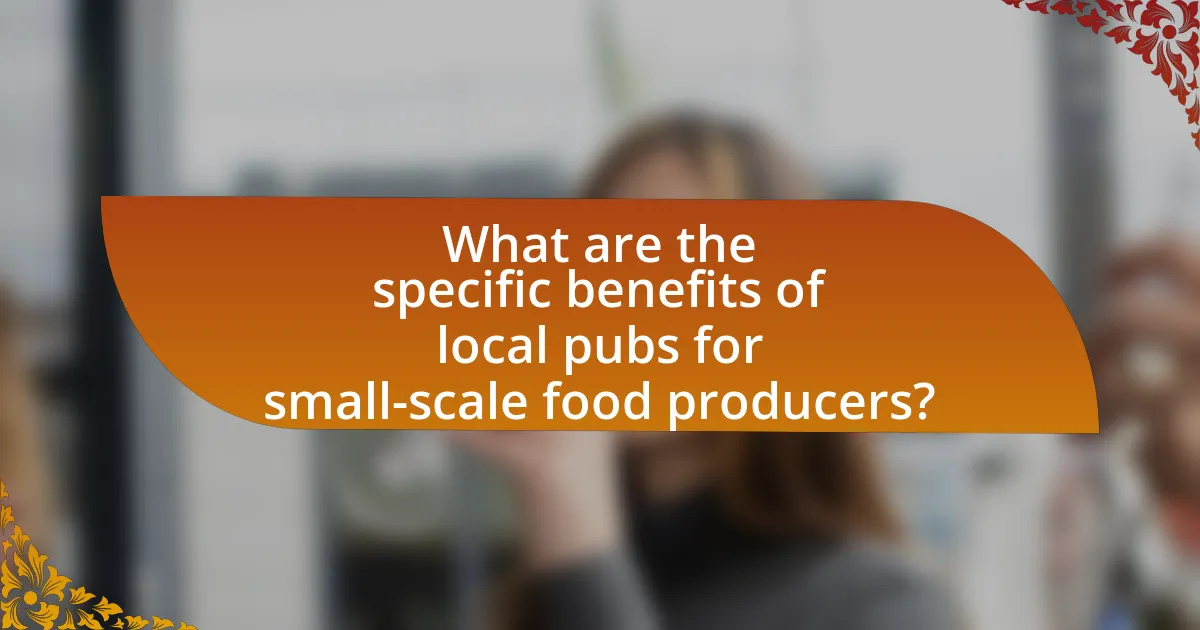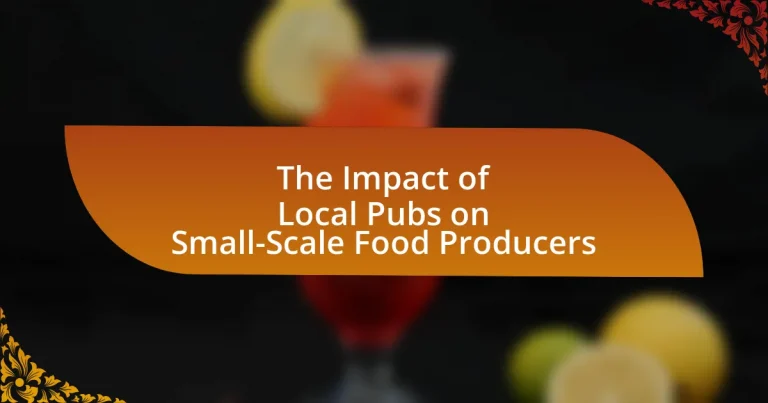The main entity of the article is the relationship between local pubs and small-scale food producers. Local pubs play a crucial role in supporting small-scale food producers by providing a direct market for their products, enhancing visibility, and fostering community ties. The article explores how local pubs source ingredients from nearby farms, benefiting various producers such as farmers, artisanal bakers, and local breweries. It also discusses the economic and environmental advantages of this partnership, including increased sales for producers, reduced carbon footprints, and the promotion of sustainable practices. Additionally, the article highlights the challenges faced by small-scale producers in collaborating with local pubs and offers best practices for establishing successful partnerships.

What is the impact of local pubs on small-scale food producers?
Local pubs significantly support small-scale food producers by providing a direct market for their products. This relationship allows small producers to reach local consumers, enhancing their visibility and sales. For instance, a study by the Campaign for Real Ale (CAMRA) found that local pubs often prioritize sourcing ingredients from nearby farms, which not only boosts the local economy but also fosters community ties. Additionally, pubs that feature local food on their menus can increase demand for small-scale producers, leading to greater sustainability and growth opportunities for these businesses.
How do local pubs support small-scale food producers?
Local pubs support small-scale food producers by sourcing ingredients directly from them, thereby creating a market for their products. This practice not only helps small producers gain visibility but also fosters community relationships and promotes local economies. For instance, a study by the Campaign for Real Ale (CAMRA) found that pubs that prioritize local sourcing contribute significantly to the sustainability of regional food systems, enhancing the livelihoods of small-scale farmers and producers. By featuring local produce on their menus, pubs also attract customers who value fresh, locally-sourced food, further driving demand for these small-scale producers.
What types of small-scale food producers benefit from local pubs?
Small-scale food producers that benefit from local pubs include farmers, artisanal bakers, and local breweries. Farmers supply fresh produce, meats, and dairy products, which local pubs often feature on their menus to promote local sourcing and sustainability. Artisanal bakers provide bread and pastries that enhance the pub’s food offerings, while local breweries supply craft beers that align with the growing trend of supporting nearby businesses. This symbiotic relationship not only boosts the local economy but also fosters community engagement and promotes the consumption of locally sourced food and beverages.
How do local pubs source food from small-scale producers?
Local pubs source food from small-scale producers primarily through direct relationships and partnerships. These establishments often prioritize local sourcing to enhance their menu offerings and support community agriculture. By establishing connections with nearby farms and artisanal producers, pubs can procure fresh, seasonal ingredients that reflect regional flavors. For instance, a study by the Food and Agriculture Organization highlights that local sourcing not only boosts the local economy but also reduces transportation costs and carbon footprints, making it a sustainable choice for pubs.
What role do local pubs play in the community?
Local pubs serve as vital social hubs within communities, fostering connections among residents and providing a space for social interaction. They often host events, support local initiatives, and promote local culture, which strengthens community ties. According to a report by the Campaign for Real Ale (CAMRA), 80% of people believe that local pubs contribute positively to community life by offering a venue for gatherings and celebrations. Additionally, local pubs frequently collaborate with small-scale food producers, sourcing ingredients from nearby farms, which not only supports the local economy but also enhances the community’s culinary identity.
How do local pubs foster relationships with food producers?
Local pubs foster relationships with food producers by sourcing ingredients directly from them, creating a mutually beneficial partnership. This practice not only supports local economies but also enhances the quality and freshness of the food served. For instance, many pubs establish regular supply agreements with nearby farms, ensuring a consistent flow of seasonal produce. Additionally, local pubs often feature menus that highlight these partnerships, promoting the food producers to their patrons. This visibility can lead to increased sales for the producers, as customers are more likely to support businesses that are connected to their community. Furthermore, events such as farm-to-table dinners or local food festivals organized by pubs strengthen these relationships by providing a platform for producers to showcase their products directly to consumers.
What community events do local pubs host to promote local food?
Local pubs host various community events such as farm-to-table dinners, local food festivals, and tasting events to promote local food. These events often feature dishes prepared with ingredients sourced from nearby farms, showcasing the region’s agricultural products. For instance, farm-to-table dinners typically highlight seasonal produce and meats, fostering a direct connection between consumers and local producers. Additionally, local food festivals may include vendor booths from small-scale farmers and artisans, allowing patrons to sample and purchase local goods, thereby supporting the local economy and enhancing community engagement.
Why are local pubs important for the sustainability of small-scale food production?
Local pubs are important for the sustainability of small-scale food production because they provide a direct market for local producers, fostering community support and reducing food miles. By sourcing ingredients from nearby farms, pubs help sustain local agriculture and promote seasonal eating, which is crucial for maintaining biodiversity and soil health. Research indicates that establishments that prioritize local sourcing can significantly boost the economic viability of small farms, as seen in studies showing that local food systems can increase farm income by up to 30%. This symbiotic relationship not only enhances the quality of food served but also strengthens local economies and communities.
How do local pubs contribute to the local economy?
Local pubs contribute to the local economy by generating revenue through sales, creating jobs, and supporting local suppliers. They often source food and beverages from nearby producers, which stimulates local agriculture and food production. For instance, a study by the Campaign for Real Ale (CAMRA) found that local pubs contribute approximately £23 billion to the UK economy annually, highlighting their significant economic impact. Additionally, local pubs provide employment opportunities, with thousands of jobs created in communities, further enhancing economic stability.
What environmental benefits arise from the partnership between local pubs and food producers?
The partnership between local pubs and food producers leads to significant environmental benefits, primarily through reduced carbon footprints and enhanced biodiversity. By sourcing ingredients locally, pubs minimize transportation emissions, which contributes to lower greenhouse gas emissions. For instance, a study by the Carbon Trust indicates that food transport can account for up to 11% of total food-related emissions, highlighting the importance of local sourcing. Additionally, local food producers often engage in sustainable farming practices that promote soil health and biodiversity, further benefiting the environment. This collaboration fosters a circular economy, where waste is reduced, and local ecosystems are supported, ultimately leading to a more sustainable food system.
How do local pubs influence consumer behavior regarding local food?
Local pubs significantly influence consumer behavior regarding local food by promoting regional dishes and sourcing ingredients from nearby producers. This practice not only enhances the authenticity of their menus but also fosters a sense of community and supports local economies. Research indicates that when pubs feature local food, consumers are more likely to choose these options, as they perceive them to be fresher and more sustainable. For instance, a study by the University of Exeter found that 70% of patrons expressed a preference for dining at establishments that prioritize local sourcing, demonstrating a clear link between pub offerings and consumer choices.
What challenges do small-scale food producers face when working with local pubs?
Small-scale food producers face several challenges when working with local pubs, including inconsistent demand, pricing pressures, and logistical issues. Inconsistent demand arises because local pubs may not have stable customer bases, leading to fluctuating orders that can complicate production planning for small producers. Pricing pressures occur as pubs often seek to minimize costs, which can result in lower prices offered to producers, impacting their profitability. Logistical issues, such as transportation and storage constraints, can also hinder small-scale producers from efficiently supplying their products to local pubs, especially if they lack the infrastructure that larger suppliers possess. These challenges collectively affect the sustainability and growth potential of small-scale food producers in their partnerships with local pubs.

What are the specific benefits of local pubs for small-scale food producers?
Local pubs provide significant benefits for small-scale food producers by offering a direct market for their products. This relationship allows producers to gain visibility and access to a customer base that values locally sourced ingredients. Pubs often prioritize local sourcing, which can lead to increased sales and brand recognition for small-scale producers. Additionally, local pubs can facilitate networking opportunities, connecting producers with other local businesses and consumers who appreciate sustainable practices. This collaboration can enhance the overall local economy, as evidenced by studies showing that local sourcing can increase community engagement and support for small businesses.
How do local pubs enhance the visibility of small-scale food producers?
Local pubs enhance the visibility of small-scale food producers by featuring their products on menus and hosting events that promote local sourcing. By showcasing locally sourced ingredients, pubs create a direct connection between consumers and food producers, increasing awareness and appreciation for their offerings. For instance, a study by the Food and Drink Federation found that 70% of consumers prefer to buy food from local suppliers when they know it is available, demonstrating the effectiveness of local pubs in driving consumer interest towards small-scale producers.
What marketing opportunities do local pubs provide for food producers?
Local pubs offer significant marketing opportunities for food producers by providing a platform for direct consumer engagement and product visibility. Pubs often feature locally sourced ingredients on their menus, which allows food producers to showcase their products to a captive audience. This not only enhances the pub’s appeal but also builds a community connection, as consumers increasingly prefer to support local businesses.
Moreover, collaborations between pubs and food producers can lead to special events, such as tasting nights or farm-to-table dinners, which further promote the producers’ offerings. According to a report by the Campaign for Real Ale, 74% of consumers are more likely to visit a pub that supports local suppliers, indicating a strong market for food producers to leverage.
Additionally, pubs can serve as a testing ground for new products, allowing food producers to gather feedback and refine their offerings based on customer preferences. This symbiotic relationship fosters brand loyalty and can lead to increased sales for both parties.
How do local pubs help in building brand loyalty for small-scale producers?
Local pubs build brand loyalty for small-scale producers by providing a direct platform for consumers to experience and engage with local products. This interaction fosters a sense of community and connection, as patrons often prefer to support local businesses that they can relate to. Research indicates that consumers are more likely to remain loyal to brands that they perceive as authentic and community-oriented, which local pubs exemplify by showcasing regional beers, wines, and foods. Additionally, local pubs often host events and tastings that highlight these small-scale producers, further enhancing visibility and consumer attachment to the brands. This strategy not only increases sales for the producers but also strengthens the overall local economy, creating a mutually beneficial relationship.
What financial advantages do small-scale food producers gain from local pubs?
Small-scale food producers gain financial advantages from local pubs through increased sales and reduced distribution costs. By supplying directly to local pubs, these producers can sell their products at a higher price point compared to larger distribution channels, which often require significant markups. Additionally, local pubs often prioritize sourcing from nearby producers, creating a reliable market for their goods and fostering community relationships that can lead to repeat business. This direct connection minimizes transportation expenses and allows producers to maintain fresher inventory, ultimately enhancing profitability.
How do local pubs affect the pricing strategies of small-scale food producers?
Local pubs influence the pricing strategies of small-scale food producers by creating a demand for locally sourced ingredients, which can lead to higher prices for those products. When pubs prioritize local sourcing, they often pay a premium for fresh, high-quality ingredients, which encourages food producers to adjust their pricing to reflect this increased value. For instance, a study by the Food and Drink Federation found that local sourcing can increase the price of ingredients by 10-20% due to the perceived quality and freshness associated with local products. This dynamic not only supports small-scale producers but also allows them to position their products as premium offerings in the market.
What are the potential revenue streams for food producers through local pubs?
Food producers can generate revenue through local pubs by supplying fresh ingredients, creating exclusive menu items, and participating in promotional events. By providing locally sourced produce, meat, or dairy, food producers can establish partnerships with pubs that emphasize farm-to-table dining, which is increasingly popular among consumers. Additionally, food producers can collaborate with pubs to develop unique dishes that highlight their products, enhancing the pub’s menu and attracting customers. Furthermore, hosting events such as farm-to-pub dinners or tasting nights can create additional revenue opportunities, as these events often draw larger crowds and promote local food culture. This symbiotic relationship not only boosts the pub’s appeal but also increases sales for food producers, demonstrating a mutually beneficial arrangement.

What are the best practices for small-scale food producers working with local pubs?
Small-scale food producers should prioritize building strong relationships with local pubs to enhance collaboration and mutual benefit. Establishing direct communication channels allows producers to understand the specific needs and preferences of the pubs, facilitating tailored offerings that align with menu requirements. Additionally, maintaining consistent quality and reliability in product supply is crucial, as it fosters trust and encourages repeat business.
Producers should also consider participating in local events or tastings hosted by pubs, which can increase visibility and create opportunities for direct feedback from consumers. Utilizing social media to promote partnerships with local pubs can further enhance brand recognition and attract a customer base that values local sourcing.
Research indicates that local sourcing can increase customer loyalty, with 70% of consumers expressing a preference for establishments that support local producers (Source: “Local Food Systems: A Global Perspective,” by the Food and Agriculture Organization). This statistic underscores the importance of collaboration between small-scale food producers and local pubs in driving business success.
How can small-scale food producers effectively market their products to local pubs?
Small-scale food producers can effectively market their products to local pubs by establishing direct relationships with pub owners and chefs, showcasing the quality and uniqueness of their offerings. Engaging in local food events or farmers’ markets allows producers to demonstrate their products and build connections with potential buyers. Additionally, providing samples and promotional materials, such as brochures detailing the sourcing and benefits of their products, can enhance visibility and appeal. Research indicates that local sourcing is increasingly valued by consumers, with 70% of diners preferring restaurants that use local ingredients, thus making it advantageous for pubs to feature local producers.
What strategies can producers use to establish partnerships with local pubs?
Producers can establish partnerships with local pubs by offering unique, locally sourced products that enhance the pub’s menu and appeal to customers. By showcasing the quality and distinctiveness of their offerings, producers can create a compelling case for collaboration. For instance, providing samples or hosting tasting events allows pubs to experience the products firsthand, fostering a relationship based on mutual benefit. Additionally, producers can leverage social media and local marketing to highlight their partnerships, increasing visibility for both parties. Research indicates that local sourcing can boost a pub’s reputation and customer loyalty, making such partnerships advantageous for both producers and pubs.
How can producers ensure consistent quality and supply for local pubs?
Producers can ensure consistent quality and supply for local pubs by implementing rigorous quality control measures and establishing reliable supply chains. Quality control involves regular testing of products for freshness and safety, which can be achieved through standardized processes and certifications. For instance, producers can adopt Good Agricultural Practices (GAP) to maintain high standards in food production.
Additionally, building strong relationships with local pubs allows producers to understand their specific needs and adjust production accordingly. This collaboration can lead to tailored offerings that meet the demand of the pubs while ensuring a steady supply. According to a study by the Food and Drink Federation, local sourcing can enhance product freshness and reduce transportation time, thereby improving quality.
Furthermore, utilizing technology for inventory management can help producers track supply levels and forecast demand accurately, ensuring that local pubs receive consistent deliveries. By combining these strategies, producers can effectively maintain the quality and reliability of their products for local pubs.
What common pitfalls should small-scale food producers avoid when collaborating with local pubs?
Small-scale food producers should avoid underestimating the importance of clear communication when collaborating with local pubs. Misunderstandings regarding product specifications, delivery schedules, and pricing can lead to dissatisfaction on both sides. For instance, a study by the Food and Drink Federation highlights that 70% of supply chain issues stem from poor communication. Additionally, producers must not overlook the significance of aligning their branding with the pub’s image; mismatched values can alienate customers. Furthermore, failing to establish a fair pricing strategy can result in financial losses, as local pubs often operate on tight margins. Lastly, neglecting to build a strong relationship with pub owners can hinder future collaborations, as trust and rapport are crucial for long-term success.
How can producers navigate contractual agreements with local pubs?
Producers can navigate contractual agreements with local pubs by clearly defining terms, understanding legal obligations, and maintaining open communication. Establishing specific clauses regarding pricing, delivery schedules, and quality standards ensures mutual understanding and reduces disputes. Additionally, producers should familiarize themselves with local laws and regulations that govern such agreements, as compliance is crucial for successful partnerships. Research indicates that transparent contracts can lead to better relationships and increased sales for small-scale food producers, as evidenced by a study from the University of Reading, which found that well-structured agreements enhance trust and collaboration between producers and local businesses.
What are the best ways to handle feedback and criticism from local pubs?
The best ways to handle feedback and criticism from local pubs include actively listening to the feedback, responding constructively, and implementing changes when necessary. Actively listening allows small-scale food producers to understand the specific concerns or suggestions from local pubs, which can enhance their products or services. Responding constructively demonstrates professionalism and a willingness to improve, fostering positive relationships with local establishments. Implementing changes based on feedback can lead to better product offerings and increased customer satisfaction, as evidenced by studies showing that businesses that adapt to customer feedback often see improved sales and loyalty.
What resources are available for small-scale food producers to connect with local pubs?
Small-scale food producers can connect with local pubs through various resources such as local food networks, farmers’ markets, and online platforms like social media and dedicated food producer directories. Local food networks often facilitate partnerships between producers and pubs by organizing events and providing contact information. Farmers’ markets serve as direct venues for producers to showcase their products and establish relationships with local pub owners. Additionally, online platforms enable producers to promote their offerings and connect with pubs seeking local sourcing options. These resources enhance visibility and foster collaboration, ultimately benefiting both producers and local pubs.


